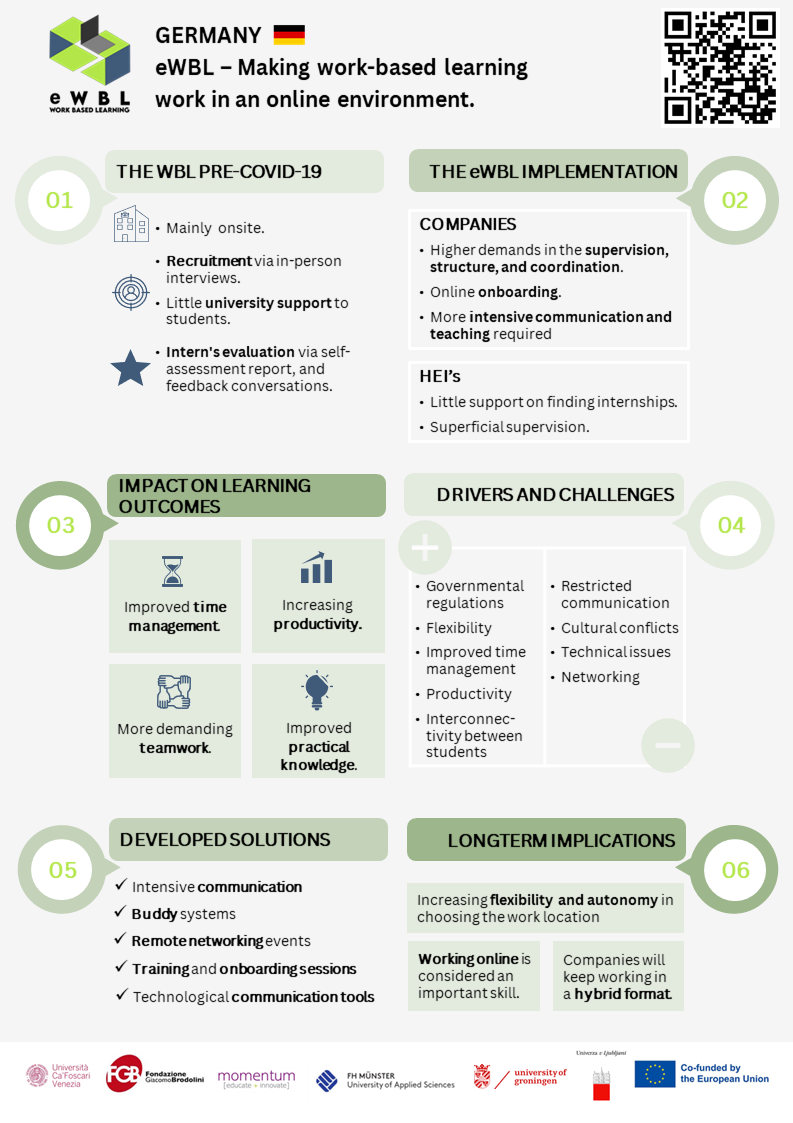7 February 2023 | Münster
The report summarizes the findings of 6 case studies that were undertaken in Germany as part of our Erasmus+ project eWBL. The study aimed to explore how work-based learning can be offered effectively in the absence of a conventional physical work environment. To this end, the study focuses on the experiences of companies and higher education institutions (HEIs) that were offering online or hybrid work-based learning opportunities to students during the COVID 19 pandemic. Each individual case involved the perspective of three key stakeholders within the context of work-based learning: students, companies and HEIs.
This national report particularly reflects on the experience of German institutions. The German educational system is characterized by a strong focus on using the workplace as an environment for learning. Work-based learning experiences are offered in various formats including vocational education training system, internships, dual study programs, and traineeships.

The German national report combines online work-based experiences offered in the context of dual study programs and internships.
Pre-COVID 19 the WBL experience largely took place onsite, and all study programs were offered at the university's campus. The recruitment of interns was undertaken via in-person interviews. It appeared most of the responsibility of supporting the interns was left for the companies and the universities' support to students was very limited. Before COVID, the intern's evaluation was via a graded or non-graded self-assessment report, and the companies used feedback sessions for evaluation.
As COVID 19 hit, almost all internships shifted to a fully online and/or hybrid format. This entails some adjustments both from HEIs and Companies to respond to the new environment. The response of HEIs was largely viewed as inadequate by the students with some of the HEIs even not accepting online internships. However, there were some HEIs who provided structured support. For instance, one of our case universities offered a program to prepare, guide, and evaluate students during their internships. When it comes to companies the amount of coordination and support for the students increased. This entailed sending the necessary hardware and software package to the interns, organizing on boarding sessions, organizing information sessions and other activities to ensure smooth transition.
The impact of eWBL on learning outcome of students has been mixed. On the one hand, improved presentation skills, increased productivity and time management skills and increased practical knowledge were reported. On the other hand, teamwork was found to be more demanding for leaders and supervisors online.
While the governmental regulations in Germany as well the increased flexibility and productivity acted as main drivers of eWBL in Germany, there were also many challenges with its implementation. Particularly, restricted communication, cultural conflicts, technical issues, and networking were all reported as main challenges.
Responding to these challenges the companies have tried to implement the following solutions: allocate more time for communication, organize training and on-boarding sessions, organize buddy system for new interns, provide supporting technological tools and organize online networking events.
Going forward, both companies and students are aware of the special advantages of online work-based learning such as flexibility and autonomy in deciding time & place and improved digital competences. However, they are also conscious of the shortcomings and anticipate a more hybrid work environment in the future.


